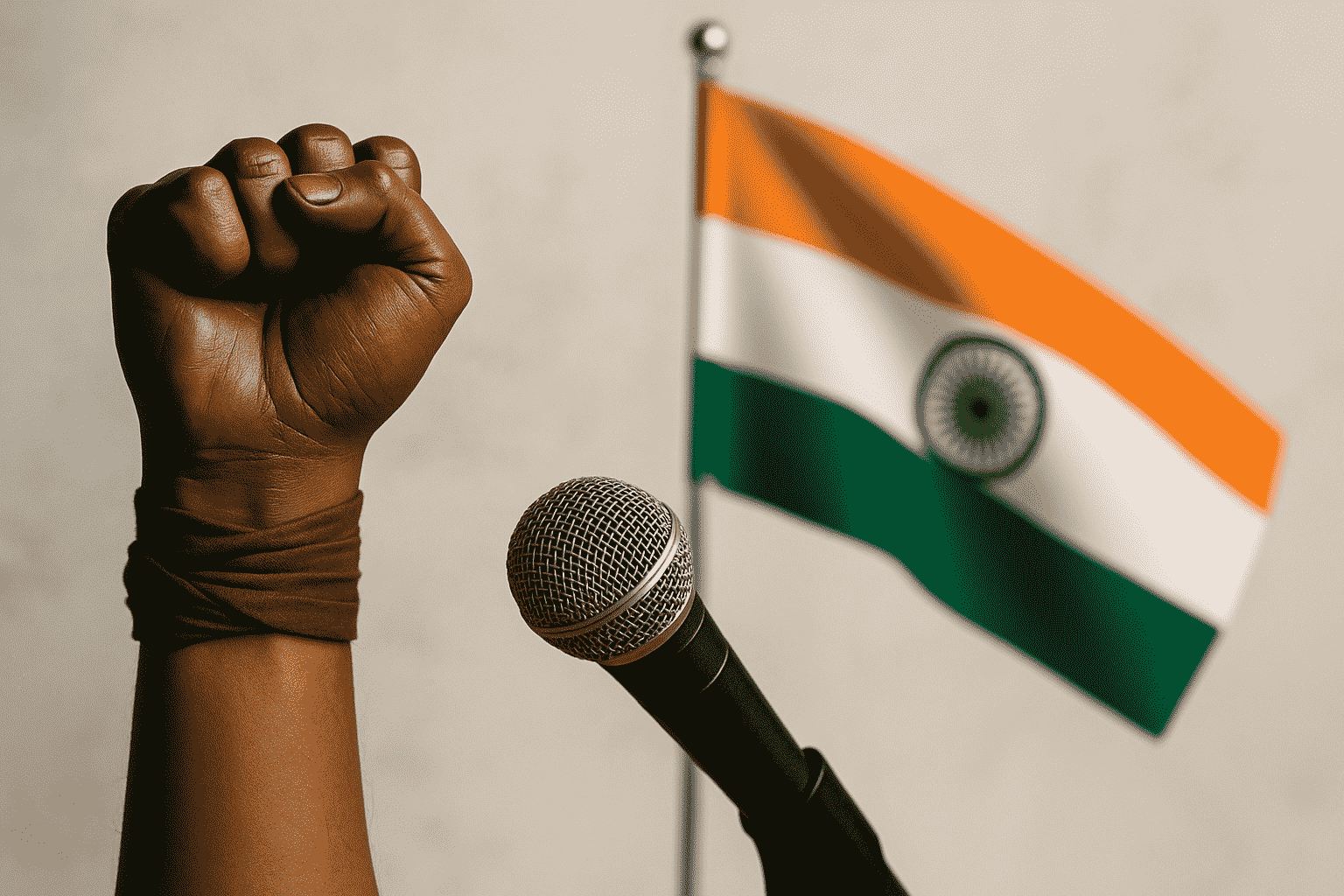This paper provides a critical critique of the concept of freedom of speech and expression in India, as well as the practice of exercising that freedom. The study investigates the historical development of this fundamental right, as well as the constitutional provisions and legal interpretations that surround it. In addition to analysing the influence of legislative limits and censorship laws, it investigates major decisions handed down by the Supreme Court that have had a significant impact on the discourse surrounding free expression. Additionally, the examination sheds light on the modern issues that are posed by legislation regarding sedition, hate speech, and digital media.
In addition, the study highlights the conflict that exists between freedom and responsibility by discussing the equilibrium that exists between national security, public order, and individual liberties. The purpose of this article is to make a contribution to the ongoing discussion regarding the protection of civil liberties in democratic societies by conducting an in-depth analysis of the circumstances surrounding freedom of speech and expression in India.
Introduction:
Freedom of expression serves as the cornerstone upon which every democratic civilisation on the planet is constructed. At the core of the concept of free speech is the liberty to freely communicate with others and to get information from them. One of the most important criteria for autonomy is regarded to be this. It is regarded as one of the most important civil freedoms that are safeguarded from repression or limitation by the state, and it is referred to as the “mother” of all other freedoms. The Constitution of India, specifically Article 19(1)(a), ensures that individuals have the fundamental right to freedom of speech and expression. In light of the fact that the right to freedom of expression is not an unrestricted right, Article 19(2) places certain restrictions on the use of this right.
Meaning and Extent of the Freedom of Speech & Expression:
The privilege of free expression is guaranteed under Article 19(1)(a) solely to Indian citizens, and not to anyone who is a foreigner and not an Indian citizen. Individuals have the right to freely express their thoughts and opinions through the use of words, literature, publications, pictures, or any other manner. This right is referred to as freedom of speech and expression. To put it another way, it involves the depiction of one’s ideas, feelings, opinions, and thoughts through any communicative medium or visual display, such as signs, gestures, symbols, and other such things. As a result, every person possesses the right to exercise such rights, while the state may impose some restrictions with regard to the exercise of these rights.
Each and every individual within the framework of Indian society is permitted to formulate their own viewpoints and freely communicate them to other people. The right of the people to get information is the fundamental principle that is being put into practice in the manner in which the concerned right is being implemented. As a consequence of this, every single person who believes that citizen participation in governmental operations is essential need to vigorously promote freedom of speech. It is imperative that the government exercise greater caution when imposing taxes on products connected to the newspaper and media sector than it does when imposing taxes on other items. This is because our community places a tremendous amount of importance on the opportunity to express oneself freely. Furthermore, public demonstrations that produce public disruptions, act as nuisances, or result in any real private or public harm do not fall under the purview of Article 19(1)(a). These protests can be religious, political, social, or an expression of some other issue.
Origin and Importance of the Right to Speech and Expression:
The right to freedom of expression is accorded a number of important considerations in India. When one takes into consideration the fact that the preamble of the Constitution guarantees all individuals, among other things, the freedom of opinion, voice, faith, worship, and religion, the significance of this provision becomes clearly evident. The Preamble, which converts freedom of expression into a fundamental civil right under Article 19(1)(a), is where the constitutional significance of freedom of speech is declared. Some people believe that the concept of free speech was first articulated in the late fifth or early sixth century before the common era.
The principles of freedom of speech and freedom of expression are featured in early documents pertaining to human rights. In 1689, England passed a document called the Bill of Rights, which secured the constitutional right to independence of speech and expression. The liberty to express oneself freely became an inalienable right after the French Revolution of 1789. Justice Oliver Wendell Holmes voiced his disagreement in the case of Abrams v. United States, which was one of the earliest cases to interpret and develop the thesis that would come to occupy a near-holy place in the legal character of the United States. Holmes asserted that the pursuit of free speech has always been an endeavour that never ends. There is a strong connection between it and democracy.
Free Speech as a Cornerstone of Democracy:
The right to freedom of speech and expression has been highly cherished for a very long time in well-functioning societies and robust democracies. For a democratic government, it has been seen to be vital and inseparable from the institution itself. It constitutes the fourth pillar of democracy. When we talk about democracy, we are referring to a kind of government that is of, run by, and owned by the people. As a consequence of this, democracy is in the hands of the general public, and the right to free and open expression is essential to the effective operation of the state. Free speech is a tool that enables people to live their lives with dignity, rather than being treated as if they were little more than animals. The concept of democracy has been criticised for its lack of significance in the absence of unrestricted and unrestricted access to speech and expression.
In the case of Romesh Thappar v. State of Madras, Chief Justice Patanjali Shastri voiced his opinion that the suitable operation of popular governmental institutions will not be achievable in the absence of open political discourse and public education opportunities.
Freedom of Speech and the freedom of the press
Freedom of expression is absolutely necessary in a democratic system, particularly when it is complemented by freedom of the press. The right to freedom of the press, which is implicit in the right to freedom of expression, is critically important for the successful operation of democracy and for the maintenance of political autonomy. There is a larger domain that encompasses freedom of speech and expression, and one of its subdomains is the freedom of the press.
In the matter of Vinod Dua v. Union of India & Ors., the petitioner, a journalist who had passed away, was charged with sedition in 2021 as a result of a video that he had made on YouTube in which he expressed his disapproval of the policies of the government. He contested the First Information Report, arguing that he was just expressing his fundamental right to freedom of speech and expression as outlined in Article 19(1)(a), and that there was no evidence to support any allegations of sedition. The First Information Report (FIR) was thrown out by a panel of two judges from the Supreme Court of India in June 2021. They did so by referencing the ruling in Indian Express Newspapers (Bombay) Private Ltd v Union of India, which said that press freedom was at the “heart of social and political interaction.”
Justification for Restrictions on Speech and Expression Freedom
Only a ‘Law,’ not operative or departmental directives, can impose restrictions on rights under Article 19(1)40. There can be no total or unrestrained freedom. 34 Article 19(2) of the Constitution limits freedom of speech and expression by allowing the State to impose “reasonable” restrictions on the below-mentioned grounds:
- “Sovereignty and integrity of India”- Constitution (Sixteenth Amendment) Act, 1963 inserted India’s sovereignty and integrity to clause (2) of Article 19, which was previously absent from the document.
- “Security of the State”- In the sake of maintaining the safety of the state, it is appropriate to impose reasonable restrictions on the right to free speech.
- “Friendly relations with foreign states”- In 1951, the Constitution (First Amendment) Act inserted this clause.
- “Public order”- The phrase “public order” is a broad concept that refers to the state of tranquilly that continues to exist among members of political society. The formation of this condition of tranquilly can be attributed to the limits that the government has imposed on the internal environment. The phrase “public order” was not included in the second paragraph of Article 19.
- “Morality or decency”- It is possible to interpret the concepts of “morality” and “decency” in a variety of ways. Sections 292-294 of the Indian Penal Code are examples of restrictions placed on the right to freedom of speech and expression. These restrictions are imposed for the sake of decency and morality.
- “Contempt of court”- There is the possibility that a particular utterance that is cloaked in the concept of freedom of speech could be restricted if it goes beyond the logical and rational boundaries of free speech and is comparable to contempt of court. In accordance with the Contempt of Courts Act of 1971, the following is the dictionary definition of the term “contempt of court”: Following the provisions of Section 2 of the aforementioned Act, the term “contempt of court” can refer to either “civil contempt” or “criminal contempt.”
- “Defamation”- A remark that is detrimental to the reputation of a person is considered to be defamatory. It is all about putting a guy in a position where he is subjected to hostility, scorn, or disdain. It is possible to find the criminal legislation that governs defamation in India under Section 499 of the Indian Penal Code (IPC), which is also referred to as Section 356 of the BNS, 2023.
- “Incitement to an offence”- This particular issue was included in the Constitution (First Amendment) Act, which was enacted in the year 1952. In no way does the right to free speech mean that one has the authority to encourage others to engage in illegal behaviour.
Conclusion:
Thus, it can be concluded that the value of free expression is defined by the extent to which citizens are permitted to practice it is a valid one to make. It is a fundamental civil right to have the freedom to free speech. It serves as the foundation upon which democratic governance is constructed. In order for the democratic process to function effectively, it is also necessary. Every individual possesses the freedom to freely express oneself and to present their points of view. It is essential for a person to have the ability to convey their thoughts, feelings, and emotions to other people, which is why speech is essential. When a human being is born, they are automatically granted this basic right. As a consequence of this, no person should be denied the fundamental right to freedom of expression.
– DR. SURENDRA MEENA, Associate Professor
Faculty of Law, Madhav University

